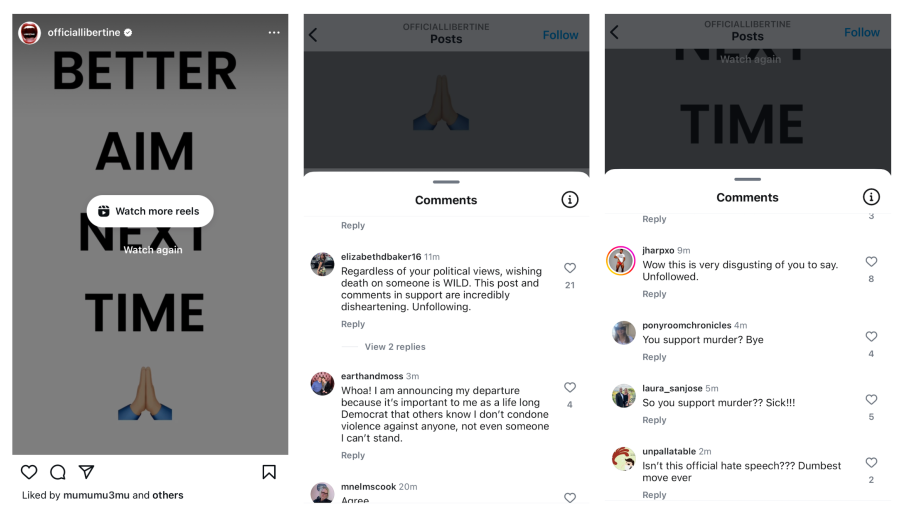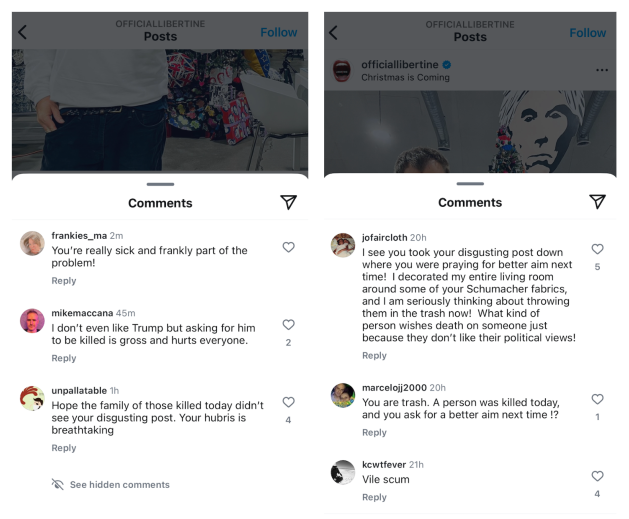This week, a status check on fashion x politics. Plus, how Vintner’s Daughter is winning discerning women, and why Vrai is selling bigger diamonds in stores than online.
(Most) fashion people don’t want to talk politics.
By way of an official statement, “thoughts and prayers” or a meme, fashion brands have made a habit of getting in, and often weighing in, on conversations big and small, from emerging TikTok trends to media-sweeping news of natural disasters. But on Saturday, as news broke out that former President Donald J. Trump was shot during a campaign rally in Pennsylvania, there was a noticeable lack of industry commentary. Los Angeles-based fashion brand Libertine was an exception, but — according to the brand’s founder and creative director — the views expressed were not his own.
“Our Instagram account was hacked yesterday (for the second time in this way btw) and as soon as we were notified about the post it was deleted,” Johnson Hartig stated in an email to Glossy on Sunday. “At Libertine, we don’t condone violence of any kind and are continuously fighting for women’s, LGBTQ+ and underserved communities’ rights.”
At 7:11 p.m. E.T., almost exactly an hour after the shots were reportedly fired, the brand’s Instagram account (@officiallibertine) posted a Reels video with the words “BETTER AIM NEXT TIME” paired with a folded-hands, or prayer-hands, emoji. By 7:35, the post had attracted nearly 40 comments from the brand’s 122,000 followers, with most expressing their disgust or intention to unfollow the brand while being sure to clarify their political views. Less than 30 minutes after being posted, the video was removed.

One comment with 21 likes stated, “Regardless of your political views, wishing death on someone is WILD. This post and comments in support are incredibly disheartening. Unfollowing.” Similarly, another commenter wrote, “Whoa! I am announcing my departure because it’s important to me as a life long Democrat that others know I don’t condone violence against anyone, not even someone I can’t stand.” Others said, “You support murder? Bye.” And, “So you support murder?? Sick!!!” Another questioned, “Isn’t this official hate speech??? Dumbest move ever.”
After the post was pulled, several commenters moved on to the next most recent post to respond to the video. Some kept it brief (“Vile scum”), while others spelled out their disappointment: “I decorated my entire living room around some of your Schumacher fabrics, and I am seriously thinking about throwing them in the trash now! … What kind of person wishes death on someone just because they don’t like their political views!” The comments remained live until at least Monday but have since been removed. Any changes to the brand’s follower count could not be detected.

According to Instagram’s Community Guidelines, it removes “content that contains credible threats or hate speech,” the latter of which it defines as “direct attacks against people” on the basis of “protected characteristics,” including race, ethnicity, disability, religious affiliation and sexual orientation, for example. In January 2022, the company announced it would take “stronger action” against posts it suspects “contain bullying, hate speech or may incite violence” by positioning them lower in the feeds and Stories of the hosting account’s followers.
Back in 2018, when an offensive Instagram direct message from Dolce & Gabbana co-designer Stefano Gabbana was widely shared, fueling backlash, the brand issued an apology and said Gabbana’s Instagram account had been hacked. Based on prior controversial comments and actions made by Gabbana, the resulting sentiment across social media was skepticism, as reported by the New York Times.
In March 2018, the politics and pop culture publication The Daily Beast reported that Libertine’s Hartig had been “a very vocal opponent of Trump.”
“He would often take to his brand’s Twitter to attack Trump’s policies until his social media director told him to stop,” the site’s Kristopher Fraser reported.
“Some designers are afraid of offending their Republican clients, but not me,” Hartig reportedly said at the time.
Libertine’s September 2016 runway included a sweatshirt featuring a sequin anarchy symbol, which Hartig told The Hollywood Reporter was motivated by the year’s presidential candidates and their misdirected priorities. Later, while debuting his spring 2019 collection, Hartig wore a T-shirt that was “expressive of the feelings … fueling his work during the Trump presidency,” Vogue reported. The tee featured the name of AC/DC’s 1978 live album, “If You Want Blood, You’ve Got It,” and an image of the band’s guitarist Angus Young being impaled by his Gibson SG.
Launched in 2001 and nominated for the CFDA/Vogue Fashion Fund in 2004, Libertine is a brand regular on the CFDA’s Official New York Fashion Week Schedule. Its styles are sold at Neiman Marcus and Bergdorf Goodman, among other retailers.
Also surfacing amid the void of political industry posts this weekend was an X post by Jeff Bezos, founder and executive chairman of Amazon, a giant in apparel retail among other categories. “Our former President showed tremendous grace and courage under literal fire tonight. So thankful for his safety and so sad for the victims and their families,” it stated.
Dominating the post’s 7,700 comments were posts accusing the Bezos-owned Washington Post of publishing “assassination porn,” primarily for a December 2023 opinion piece titled, “Yes, it’s okay to compare Trump to Hitler. Don’t let me stop you.” Many others criticized its coverage of Saturday’s shooting, especially a headline that read, “Trump escorted away after loud noises at Pa. rally.” Bezos purchased the newspaper in 2013.
”A general rule of thumb for brands is to stay away from political commentary on external platforms,” said Larissa Milashenko, an NYC-based PR, brand and marketing consultant. “After the product, the customer comes first, and you risk losing and alienating an entire customer base. Also, if you weigh in on one political event, do you comment on all? Or, where exactly are those boundaries? It’s a lose-lose. … But social or cultural matters are up for grabs, especially if they align with the brand’s core values.”
Of the five PR executives Glossy contacted with a request for comment on whether and how brands should respond to political news, three didn’t respond and one declined the opportunity.
Quote of the week
During a call with Glossy this week, April Gargiulo, founder of the luxury skin-care brand Vintner’s Daughter, discussed how the company caters to “the most discerning women in the world.”
“I get asked all the time, ‘Who’s your average customer? What’s the Vintner’s Daughter demographic?’ And I always say, ‘We don’t have a demographic. We have a psychographic.’ Our psychographic is the most discerning women in the world — that is it. And that doesn’t mean they’re all millionaires or billionaires. It means that, when it comes to what goes into their house, what goes on their bodies and what goes in their bodies, they care about it very deeply. I don’t mean just in an ‘It has to be organic’ way. … The companies they are going to live with have to live up to a very extreme set of values. And I find that to be so beautiful and inspiring. … I almost don’t like the word luxury because it implies the world of giant logos studded with diamonds. But true luxury is something very different. I think it’s about quality, craftsmanship, a heritage, a discipline and an expertise. And it’s not about marketing and growth for growth’s sake. I always say, ‘We’re skin-driven, we’re not revenue-driven.’ And I think most companies are revenue-driven to the detriment of their customer.”
Stat of the week
4
The average carat weight of a piece of jewelry purchased at a Vrai store. In-store purchases average 2-2.5 carats, CEO Mona Akhavi told Glossy this week.
When lab-grown diamond jewelry brand Vrai launched in 2014, its only sales channel was its e-commerce site. Now, the company has eight stores across the U.S., Canada and Europe, which drive 50% of the business. Fewer, but larger styles are selling in stores, Akhavi said.
“The customer who comes into the store has done their research,” she said. “They know the brand and they’re looking for something specific. And, once they see the piece and the diamond, any uncertainty about buying a lab-grown diamond melts away. With the online customer, there’s more price sensitivity.”
Around the web
Brunello Cucinelli’s new AI-powered e-commerce site will tell you what you’d like to know. ‘Brat summer’ has infiltrated luxury. Richemont is the latest luxury conglomerate to report sluggish sales in China. Celebs’ Wimbledon style, decoded. EssilorLuxottica is Supreme’s new owner.
The latest from Glossy
Why David Yurman is getting into sports marketing
Burberry is Europe’s latest victim of layoffs and restructuring
After the Trump rally shooting, analysts predict benefits to American companies, risks for Europeans




